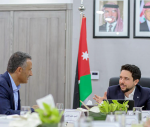You are here
The purpose of a visit
Jun 08,2016 - Last updated at Jun 08,2016
Israeli Prime Minister Benjamin Netanyahu has just concluded another visit to Moscow, the fourth he held with Russian President Vladimir Putin during this last year, for talks on cooperation, especially on the military front, ostensibly to combat terrorism.
Netanyahu, conscious of the shifting big-power influence in the Middle East, is cultivating the friendship of the leader of one of the five veto-wielding powers at the UN, mindful of Russia’s growing influence in the Syrian civil war and other Middle Eastern conflicts as the US’ footprint in the region is diminishing.
“We discussed the continued coordination between our two militaries in the region, which already works quite well,” Netanyahu told reporters at a joint conference with Putin at the end of their talks in the Kremlin.
“We want to avoid conflict and make sure we are operating against those same entities that endanger everyone,” added Netanyahu, while Putin spoke about the “necessity to pool efforts to counter international terrorism”, a fight in which “we are unconditional allies”.
There is, however, more than meets the eye to the warming of relations between Israel and Russia.
The two countries are at odds over Iran, which Israel views as its ultimate enemy in the region while Russia regards as an ally in the civil war in Syria, where both back the regime of President Bashar Assad.
Israel also regards Hizbollah as an archenemy against which it waged several wars over the past years, while Russian forces fight alongside Hizbollah guerrillas to keep Assad in power.
And, as it stands today, Russia alone seems to be able to prevent Israel’s three strongest enemies — Syria, Iran and Hizbollah — from attacking it from the north.
Interest makes strange bedfellows.
At a different level, over 1 million Russian speakers live in Israel, and Moscow agreed to pay pensions to tens of thousands of Russian immigrants to Israel, a gift that cannot be overlooked and that naturally helps warm up the relationship between the two.
And with the US administration and France hinting that they might back a future UN Security Council resolution against Israeli settlements on occupied Palestinian land, Netanyahu has an interest in finding out Russia’s stand on the issue. Having Moscow on Israel’s side can only please Netanyahu.
How events will play out in the fickle Middle East is anyone’s guess, but it is clear that Netanyahu wants to leave nothing to chance.












